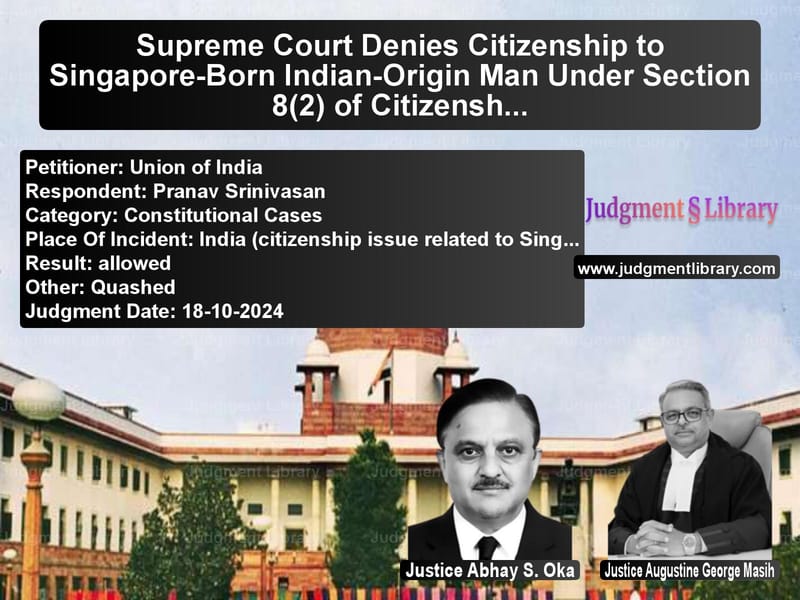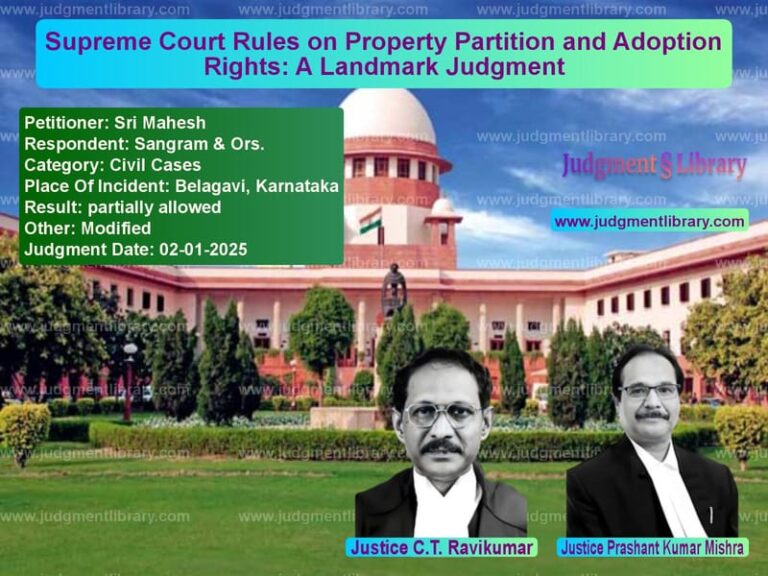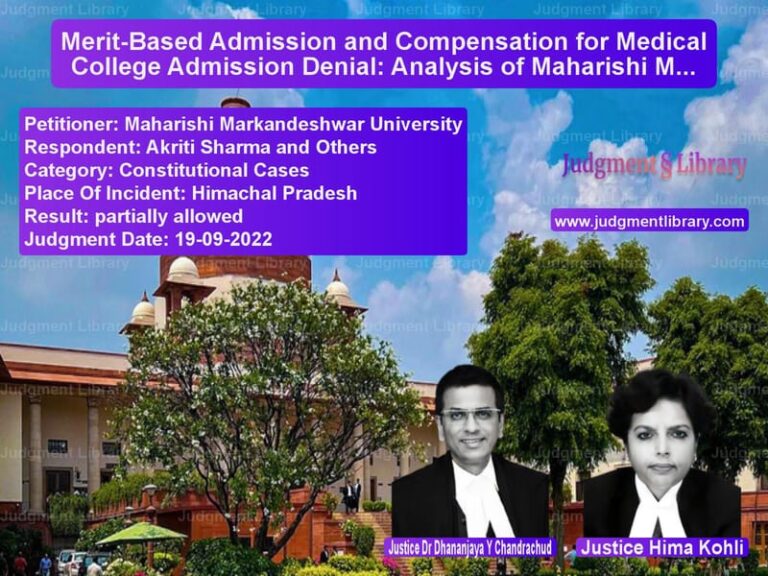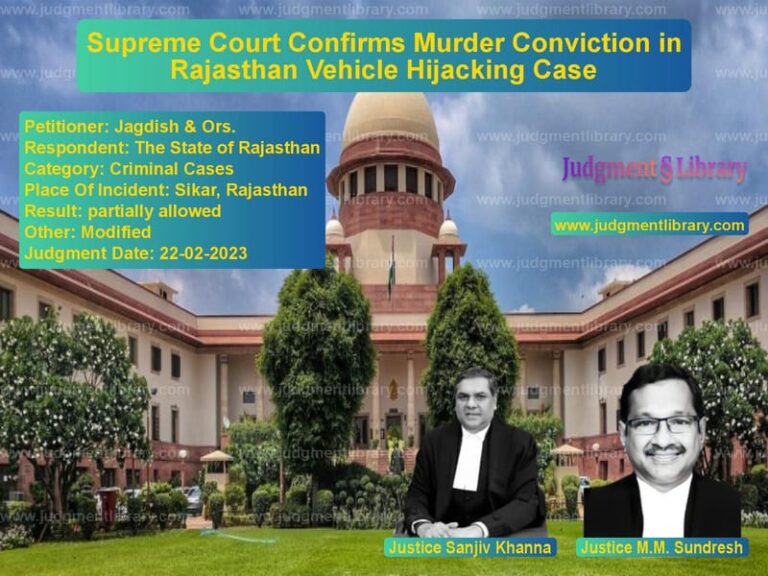Supreme Court Denies Citizenship to Singapore-Born Indian-Origin Man Under Section 8(2) of Citizenship Act
The Supreme Court of India, in the case of Union of India v. Pranav Srinivasan, delivered a landmark judgment on October 18, 2024, ruling against the claim of Indian citizenship by Pranav Srinivasan, a Singapore-born individual of Indian origin. The case revolved around the interpretation of Section 8(2) of the Citizenship Act, 1955, and whether a person born to Indian parents who later renounced their Indian citizenship can claim resumption of Indian citizenship. The Court upheld the Union of India’s position, denying Srinivasan’s claim and setting a significant precedent on citizenship laws in India.
Background of the Case
Pranav Srinivasan was born in Singapore on March 1, 1999. His paternal grandparents were born in India before independence, and his parents were born in India in 1963 and 1972, respectively. However, his parents acquired Singaporean citizenship on December 19, 1998, before Pranav’s birth. According to the government, this meant they had automatically ceased to be Indian citizens under Section 9(1) of the Citizenship Act. Later, on April 20, 2012, Pranav’s parents formally renounced their Indian citizenship.
On May 5, 2017, Pranav, then 18 years and two months old, applied for resumption of Indian citizenship under Section 8(2) of the Citizenship Act. His application was initially ignored, leading him to file a writ petition before the Madras High Court. The High Court ruled in his favor, stating that he was entitled to resumption of Indian citizenship under the Act. The Union of India appealed this decision before the Supreme Court.
Petitioner’s Arguments (Union of India)
The Union of India, represented by Additional Solicitor General K.M. Nataraj, argued:
- Loss of Indian Citizenship: Pranav’s parents had voluntarily acquired Singaporean citizenship before his birth, thereby losing their Indian citizenship as per Section 9(1) of the Citizenship Act. As a result, Pranav was never an Indian citizen.
- Inapplicability of Section 8(2): The provision only applies when a minor child’s parents voluntarily renounce Indian citizenship. Since Pranav’s parents lost their citizenship automatically under Section 9(1), Section 8(2) did not apply to him.
- Article 8 of the Constitution: The provision applies only to persons of Indian origin who were living outside India at the time of the Constitution’s commencement. It does not confer citizenship to persons born after India’s independence.
- Indian Citizenship by Registration: The government contended that Pranav could only apply for citizenship under Section 5(1)(b) of the Citizenship Act as a foreign national of Indian origin, not as someone seeking to “resume” Indian citizenship.
Respondent’s Arguments (Pranav Srinivasan)
Pranav’s counsel, C.S. Vaidyanathan, made the following counterarguments:
- Right to Resumption of Citizenship: Pranav had applied for resumption of citizenship under Section 8(2) within three months of turning 18. He had also taken an oath of allegiance to India at the time of application.
- Indian Origin Status: Pranav’s grandparents were born in India before independence, and his parents were born in India after independence. As per Article 8 of the Constitution, he should be deemed an Indian citizen.
- Violation of Fundamental Rights: Denying citizenship based on technical grounds was arbitrary and violated his rights under Articles 14 and 21 of the Constitution.
Supreme Court’s Analysis and Judgment
Interpretation of Section 8(2) of the Citizenship Act
The Court ruled that Section 8(2) applies only if the parents of a minor child formally renounce Indian citizenship. However, in this case, Pranav’s parents automatically lost Indian citizenship under Section 9(1) upon acquiring Singaporean citizenship. The Court stated:
“Where a person ceases to be a citizen of India under Section 9(1), there is no voluntary renunciation under Section 8(1). Since Section 8(2) applies only in cases where citizenship is voluntarily renounced, Pranav cannot claim citizenship under this provision.”
Article 8 and Citizenship by Origin
The Court rejected Pranav’s claim under Article 8 of the Constitution:
“Article 8 applies only to persons residing outside India at the time of the Constitution’s commencement. It does not grant automatic citizenship to persons born outside India after independence.”
Citizenship by Registration Under Section 5
The Court clarified that Pranav could still apply for Indian citizenship under Section 5(1)(b), which applies to foreign nationals of Indian origin:
“Pranav may still seek Indian citizenship by registration under Section 5(1)(b). However, his application under Section 8(2) is not maintainable.”
Rejection of the High Court’s Ruling
The Supreme Court overturned the Madras High Court’s decision, holding:
“The High Court erred in holding that Pranav had resumed Indian citizenship. Citizenship laws must be interpreted strictly, and there is no provision allowing for automatic resumption of citizenship under Section 8(2) where citizenship was lost under Section 9(1).”
Impact of the Judgment
The ruling has significant implications:
- Strict Interpretation of Citizenship Laws: The decision reinforces that citizenship laws must be strictly followed and interpreted as per statutory provisions.
- Clarification on Resumption of Citizenship: The judgment makes it clear that only children whose parents formally renounce Indian citizenship can seek resumption under Section 8(2).
- Foreign Nationals Must Apply Under Section 5: The ruling establishes that individuals of Indian origin born abroad must apply for citizenship under Section 5, not through resumption under Section 8(2).
Conclusion
The Supreme Court’s judgment in Union of India v. Pranav Srinivasan is a defining moment in India’s citizenship jurisprudence. It clarifies the distinction between renunciation and automatic termination of citizenship and ensures that citizenship laws are applied consistently. While Pranav has lost his bid for automatic resumption of Indian citizenship, the ruling allows him to apply under Section 5(1)(b), providing a lawful path for foreign nationals of Indian origin to become Indian citizens.
Petitioner Name: Union of India.Respondent Name: Pranav Srinivasan.Judgment By: Justice Abhay S. Oka, Justice Augustine George Masih.Place Of Incident: India (citizenship issue related to Singapore).Judgment Date: 18-10-2024.
Don’t miss out on the full details! Download the complete judgment in PDF format below and gain valuable insights instantly!
Download Judgment: union-of-india-vs-pranav-srinivasan-supreme-court-of-india-judgment-dated-18-10-2024.pdf
Directly Download Judgment: Directly download this Judgment
See all petitions in Fundamental Rights
See all petitions in Constitution Interpretation
See all petitions in Public Interest Litigation
See all petitions in Separation of Powers
See all petitions in Legislative Powers
See all petitions in Judgment by Abhay S. Oka
See all petitions in Judgment by Augustine George Masih
See all petitions in allowed
See all petitions in Quashed
See all petitions in supreme court of India judgments October 2024
See all petitions in 2024 judgments
See all posts in Constitutional Cases Category
See all allowed petitions in Constitutional Cases Category
See all Dismissed petitions in Constitutional Cases Category
See all partially allowed petitions in Constitutional Cases Category







